Will Kurt [Will Kurt] - Get Programming with Haskell
Here you can read online Will Kurt [Will Kurt] - Get Programming with Haskell full text of the book (entire story) in english for free. Download pdf and epub, get meaning, cover and reviews about this ebook. year: 2018, publisher: Manning Publications, genre: Home and family. Description of the work, (preface) as well as reviews are available. Best literature library LitArk.com created for fans of good reading and offers a wide selection of genres:
Romance novel
Science fiction
Adventure
Detective
Science
History
Home and family
Prose
Art
Politics
Computer
Non-fiction
Religion
Business
Children
Humor
Choose a favorite category and find really read worthwhile books. Enjoy immersion in the world of imagination, feel the emotions of the characters or learn something new for yourself, make an fascinating discovery.
- Book:Get Programming with Haskell
- Author:
- Publisher:Manning Publications
- Genre:
- Year:2018
- Rating:5 / 5
- Favourites:Add to favourites
- Your mark:
Get Programming with Haskell: summary, description and annotation
We offer to read an annotation, description, summary or preface (depends on what the author of the book "Get Programming with Haskell" wrote himself). If you haven't found the necessary information about the book — write in the comments, we will try to find it.
Summary
Get Programming with Haskell introduces you to theHaskell language without drowning you in academic jargon and heavyfunctional programming theory. By working through 43 easy-to-followlessons, youll learn Haskell the best possible wayby doingHaskell!
About the Technology
Programming languages often differ only around the edgesa fewkeywords, libraries, or platform choices. Haskell gives you anentirely new point of view. To the software pioneer Alan Kay, achange in perspective can be worth 80 IQ points and Haskellersagree on the dramatic bene ts of thinking the Haskell waythinkingfunctionally, with type safety, mathematical certainty, and more.In this hands-on book, thats exactly what youll learn to do.
About the Book
Get Programming with Haskell leads you through shortlessons, examples, and exercises designed to make Haskell your own.It has crystal-clear illustrations and guided practice. You willwrite and test dozens of interesting programs and dive into customHaskell modules. You will gain a new perspective on programmingplus the practical ability to use Haskell in the everyday world.(The 80 IQ points: not guaranteed.)
Whats inside
Thinking in Haskell
Functional programming basics
Programming in types
Real-world applications for Haskell
About the Reader
Written for readers who know one or more programminglanguages.
About the Author
Will Kurt currently works as a data scientist. He writes a blogat www.countbayesie.com, explaining data science to normalpeople.
Will Kurt [Will Kurt]: author's other books
Who wrote Get Programming with Haskell? Find out the surname, the name of the author of the book and a list of all author's works by series.

![Will Kurt [Will Kurt] Get Programming with Haskell](/uploads/posts/book/116897/thumbs/will-kurt-will-kurt-get-programming-with-haskell.jpg)
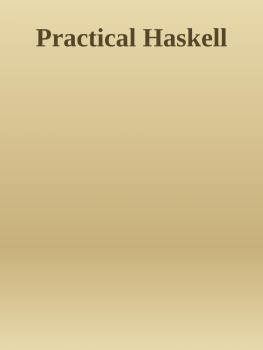
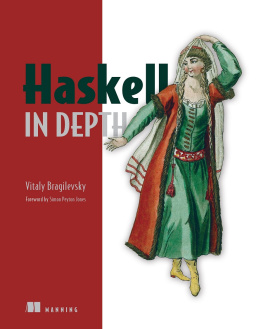
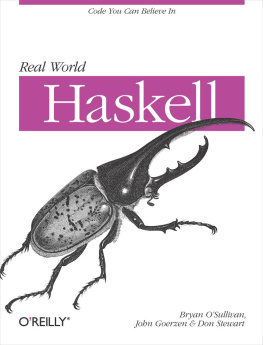

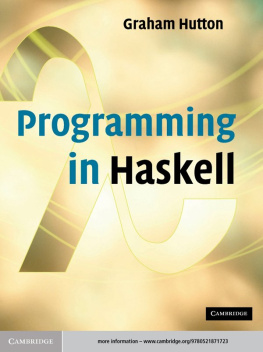
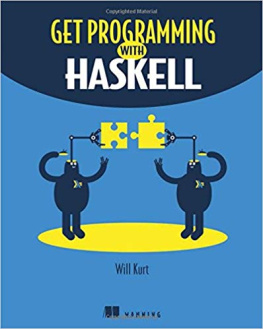
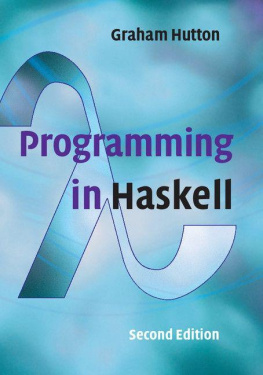
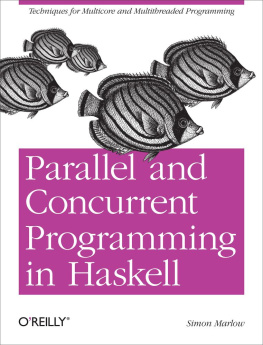


 Recognizing the importance of preserving what has been written, it is Mannings policy to have the books we publish printed on acid-free paper, and we exert our best efforts to that end. Recognizing also our responsibility to conserve the resources of our planet, Manning books are printed on paper that is at least 15 percent recycled and processed without the use of elemental chlorine.
Recognizing the importance of preserving what has been written, it is Mannings policy to have the books we publish printed on acid-free paper, and we exert our best efforts to that end. Recognizing also our responsibility to conserve the resources of our planet, Manning books are printed on paper that is at least 15 percent recycled and processed without the use of elemental chlorine.